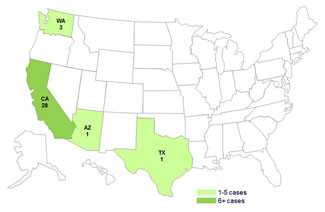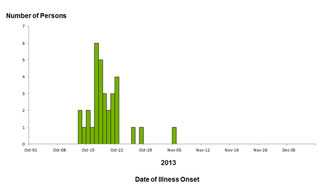Multistate Outbreak of Shiga toxin-producing Escherichia coli O157:H7 Infections Linked to Ready-to-Eat Salads (Final Update)
Posted December 11, 2013 3:00 PM ET
This particular outbreak appears to be over. However, E. coli is still an important cause of human illness in the United States. More information about E. coli, and steps people can take to reduce their risk of infection, can be found on the CDC E. coli Web Page.
Highlights
- Read the Advice to Consumers »
- A total of 33 persons infected with the outbreak strain of STEC O157:H7 were reported from four states.
- The number of ill persons identified in each state was as follows: Arizona (1), California (28), Texas (1), and Washington (3).
- 32% of ill persons were hospitalized. Two ill persons developed hemolytic uremic syndrome (HUS), and no deaths were reported.
- The STEC O157:H7 PFGE pattern combination in this outbreak was new to the PulseNet database.
- Epidemiologic and traceback investigations conducted by local, state, and federal officials indicated that consumption of two ready-to-eat salads, Field Fresh Chopped Salad with Grilled Chicken and Mexicali Salad with Chili Lime Chicken, produced by Glass Onion Catering and sold at Trader Joe’s grocery store locations, was the likely source of this outbreak of STEC O157:H7 infections.
- On November 10, 2013, Glass Onion Catering voluntarily recalled numerous ready-to-eat salads and sandwich wrap products that may be contaminated with STEC O157:H7.
- Read the list of recalled products regulated by USDA’s Food Safety and Inspection Service (FSIS).
- Read the list of recalled products regulated by the U.S. Food and Drug Administration (FDA).
- Although the “Best By” dates have passed for the recalled products, consumers should still check their homes and refrigerators for any of the ready-to-eat salad products and wraps.
- Do not eat the recalled products and dispose of any remaining product.
- People who have eaten a recalled product should look for signs of STEC infection.
- This outbreak appears to be over. However, E. coli is still an important cause of human illness in the United States. More information about E. coli, and steps people can take to reduce their risk of infection, can be found on the CDC E. coli homepage.
Outbreak Summary
Introduction
CDC collaborated with public health officials in several states, the U.S. Food Safety and Inspection Service (FSIS), and the U.S. Food and Drug Administration (FDA) to investigate a multistate outbreak of Shiga toxin-producing Escherichia coli O157:H7 (STEC O157:H7) infections. Results from this investigation linked this outbreak to two ready-to-eat salads, Field Fresh Chopped Salad with Grilled Chicken and Mexicali Salad with Chili Lime Chicken, produced by Glass Onion Catering and sold at Trader Joe’s grocery store locations.
Public health investigators used DNA “fingerprints” of E. coli bacteria obtained through diagnostic testing with pulsed-field gel electrophoresis, or PFGE, to identify cases of illness that were part of this outbreak. They used data from PulseNet, the national subtyping network made up of state and local public health laboratories and federal food regulatory laboratories that performs molecular surveillance of foodborne infections.
The type of bacteria responsible for this outbreak was among those referred to as Shiga toxin-producing E. coli or STEC. STEC bacteria are grouped by serogroups (e.g., O157 or O145). The STEC serogroup found most commonly in U.S. patients is E. coli O157.
A total of 33 ill persons infected with the outbreak strain of STEC O157:H7 were reported from four states. The number of ill people identified in each state with the outbreak strain was as follows: Arizona (1), California (28), Texas (1), and Washington (3).
Among persons for whom information was available, illness onset dates ranged from October 13, 2013 to November 5, 2013. Ill persons ranged in age from 2 years to 78 years, with a median age of 29 years. Sixty percent of ill persons were female. Among 22 ill persons with available information, seven (32%) were hospitalized. Two ill persons developed hemolytic uremic syndrome (HUS), a type of kidney failure. No deaths were reported.
This particular outbreak appears to be over. However, E. coli is still an important cause of human illness in the United States. More information about E. coli and steps people can take to reduce their risk for infection can be found on the CDC E. coli homepage.
Investigation of the Outbreak
Epidemiologic and traceback investigations conducted by officials in local, state, and federal public health, agriculture, and regulatory agencies linked this outbreak to ready-to-eat salads produced by Glass Onion Catering of Richmond, California.
State public health officials interviewed ill persons to obtain information regarding foods they might have eaten and other exposures in the week before illness. Nineteen (86%) of 22 ill persons interviewed report shopping at different Trader Joe’s grocery store locations. Twelve (80%) of 15 ill persons reported consuming a ready-to-eat salad purchased from Trader Joe’s. Two types of ready-to-eat salads, the Field Fresh Chopped Salad with Grilled Chicken and Mexicali Salad with Chili Lime Chicken, were reportedly consumed by 12 (80%) of 15 ill persons during interviews.
On November 10, 2013, Glass Onion Catering voluntarily recalled approximately 181,620 pounds of ready-to-eat salads and sandwich wrap products with fully cooked chicken and ham that may be contaminated with STEC O157:H7. The products were produced between September 23, 2013 and November 6, 2013 and shipped to distribution centers intended for retail sale [PDF - 13 pages] in Arizona, California, Nevada, New Mexico, Oregon, Texas, Utah and Washington. These were products regulated by FSIS. Products regulated by FSIS bear the establishment number “P-34221” inside the USDA mark of inspection.
In a related recall announcement on November 10, 2013, Glass Onion Catering recalled additional ready-to-eat salads and wraps. These were products regulated by FDA. These products had “Best By” dates of September 23, 2013 through November 14, 2013.
USDA-FSIS and FDA continue their investigations to identify the ultimate source of contamination.
Progression of the Outbreak Investigation
December 11, 2013 Final Case Count Update
A total of 33 individuals infected with the outbreak strain of STEC O157:H7 were reported from four states. Since the last update on November 21, 2013, one new ill person was reported from California.
Among persons for whom information was available, illness onset dates ranged from October 13, 2013 to November 5, 2013. Ill persons ranged in age from 2 years to 78 years, with a median age of 29 years. Sixty percent of ill persons were female. Among 22 persons with available information, seven (32%) were hospitalized. Two ill persons developed HUS, and no deaths were reported.
November 21, 2013 Case Count Update
As of November 19, 2013, a total of 32 individuals infected with the outbreak strain of STEC O157:H7 have been reported from four states. Since the last update on November 10, 2013, six new ill persons have been reported from two states: California (5) and Texas (1).
Among persons for whom information is available, illness onset dates range from October 13, 2013 to October 26, 2013. Ill persons range in age from 2 years to 78 years, with a median age of 29 years. Fifty-nine percent of ill persons are female. Among 22 persons with available information, 7 (32%) reported being hospitalized. Two ill persons have developed HUS, and no deaths have been reported.
Illnesses that occurred after October 26, 2013 might not be reported yet due to the time it takes between when a person becomes ill and when the illness is reported. This takes an average of 2 to 3 weeks.
Investigation Update
Epidemiologic and traceback investigations conducted by officials in local, state, and federal public health, agriculture, and regulatory agencies indicate that consumption of two ready-to-eat salads, Field Fresh Chopped Salad with Grilled Chicken and Mexicali Salad with Chili Lime Chicken, produced by Glass Onion Catering and sold at Trader Joe’s grocery store locations, are one likely source of this outbreak of STEC O157:H7 infections.
In interviews, ill persons answered questions about foods consumed and other exposures during the week before becoming ill. Nineteen (86%) of 22 ill persons interviewed report shopping at different Trader Joe’s grocery store locations. Twelve (80%) of 15 ill persons reported consuming a ready-to-eat salad purchased from Trader Joe’s. Two types of ready-to-eat salads, the Field Fresh Chopped Salad with Grilled Chicken and Mexicali Salad with Chili Lime Chicken, were reportedly consumed by 12 (80%) of 15 ill persons during interviews.
CDC and state and local public health partners are continuing laboratory surveillance through PulseNet to identify additional ill persons and to interview ill persons about foods eaten before becoming ill. FSIS and FDA are continuing to work closely with CDC and state partners during this investigation.
Initial Announcement November 10, 2013
CDC is collaborating with public health officials in California, Washington, and Arizona; the U.S. Department of Agriculture’s Food Safety and Inspection Service (USDA-FSIS); and the U.S. Food and Drug Administration (FDA) to investigate a multistate outbreak of Shiga toxin-producing Escherichia coli O157:H7 (STEC O157:H7) infections. Public health investigators are using DNA "fingerprints" of E. coli bacteria obtained through diagnostic testing with pulsed-field gel electrophoresis, or PFGE, to identify cases of illness that could be part of this outbreak. They are using data from PulseNet, the national subtyping network made up of state and local public health laboratories and federal food regulatory laboratories that performs molecular surveillance of foodborne infections.
The type of bacteria responsible for this outbreak is among those referred to as Shiga toxin-producing E. coli, or STEC. Some types of STEC frequently cause severe disease, including bloody diarrhea and hemolytic uremic syndrome (HUS), which is a type of kidney failure. STEC bacteria are divided into serogroups (e.g., O157 or O121). E. Coli O157 is the STEC serogroup found most commonly in U.S. patients. The STEC O157:H7 PFGE pattern combination in this outbreak is new to the PulseNet database. It has never been seen before.
A total of 26 individuals infected with the outbreak strain of STEC O157:H7 have been reported from three states. The number of ill persons identified in each state is as follows: Arizona (1), California (22), and Washington (3).
Among persons for whom information is available, illness onset dates range from September 29, 2013 to October 26, 2013. Ill persons range in age from 4 years to 78 years, with a median age of 28 years. Sixty-one percent of ill persons are female. Among 21 persons with available information, 6 (28%) reported being hospitalized. Two ill persons have developed HUS, and no deaths have been reported.
Epidemiologic and traceback investigations conducted by officials in local, state, and federal public health, agriculture, and regulatory agencies indicate that two ready-to-eat salads, Field Fresh Chopped Salad with Grilled Chicken and Mexicali Salad with Chili Lime Chicken, produced by Glass Onion Catering and sold at Trader Joe’s grocery store locations, are one likely source of this outbreak of STEC O157:H7 infections.
CDC and state and local public health partners are continuing laboratory surveillance through PulseNet to identify additional ill persons and to interview ill persons about foods eaten before becoming ill. FSIS and FDA are continuing to work closely with CDC and state partners during this investigation. This investigation is ongoing and work is continuing to determine the source of contamination and identify any other potentially contaminated products still on the market. CDC will update the public when additional information is available.
More Information
- Page last reviewed: December 11, 2013
- Page last updated: December 11, 2013
- Content source:


 ShareCompartir
ShareCompartir

